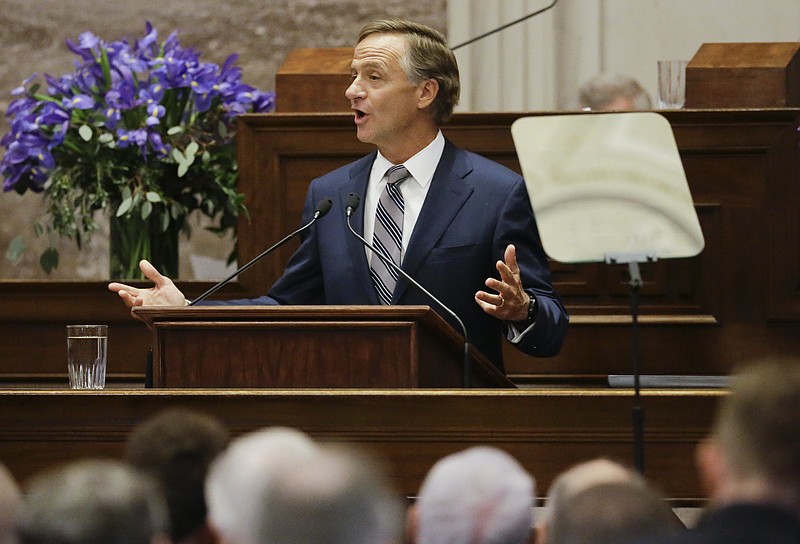NASHVILLE - Two top House Republican leaders on Wednesday countered Gov. Bill Haslam's proposed gas tax increases with an alternative plan that calls for diverting money from the state's existing 7 percent sales tax base to fund needed road improvements.
"A quarter percent of one percent of those funds [we] would simply allocate to transportation funding needs," said Assistant Majority Leader David Hawk, R-Greeneville, who unveiled the plan at a news conference with Majority Leader Glen Casada, R-Franklin.
Haslam's plan seeks to raise the existing 21.4-cents-per-gallon gas tax by 7 cents and the 18.4 cents diesel tax by 12 cents. He says the hikes are necessary to tackle the state's estimated $10.5 billion backlog of nearly 1,000 transportation projects.
Fuel tax increases, the first since 1989, would raise an estimated $227.8 million for state needs and another $117.1 million for cities and counties under statutory sharing provisions.
Other aspects of Haslam's plan include raising vehicle registration fees and imposing a $100 annual fee on electric vehicles. That raises an additional $51 million for a total of $278.5 million for state projects.
Hawk said his plan is far simpler and involves no tax increase. Diverting a quarter percentage point of Tennessee's 7 percent sales tax to transportation funding, he said, would provide two-thirds, about $194 million, for state roads and some $95.5 million for cities' and counties' combined share.
Tennessee has relied on the gas tax to fund roads for nearly a century. It was created in 1924.
Haslam, a Republican, has been facing pushback for weeks on his call to boost fuel taxes for two reasons. One is the GOP-dominated General Assembly's aversion to tax increases. The House has had such large turnover in the past six years that most members have never had to deal with raising taxes. The other is an estimated $1.1 billion surplus in one-time, non-recurring revenue and some $957 million in expected recurring money. Haslam has proposed cutting several general fund taxes that pay for most areas of government in order to produce a revenue neutral effect to soothe fellow Republicans.
On Tuesday, Haslam issued a challenge to critics.
"Show me the math on your plan and show me what you want to take out of the general fund if you're going to pay for it with general fund money," Haslam said. "Or show me what tax that you're proposing to cut that you don't want to cut now because you want to use that money for roads."
Even before Hawk and Casada presented their plan, it was getting a chilly reception from Lt. Gov. Randy McNally, R-Oak Ridge, the new Senate speaker, who warned any departure from the dedicated fuel taxes that now pay for roads "puts our fiscal stability at risk."
"Tennessee is one of the most fiscally sound states in the nation," said McNally, the former Senate Finance Committee chairman.
"Our taxes are minimal, our debt per capita is low, and we have a small and efficient government," he said. "We accomplished this by being frugal, disciplined and smart. We have an outstanding pay-as-you-go road system that operates with little to no debt. We accomplished this with dedicated funding through our gasoline user fee.
" Our system has earned us a Triple-A bond rating from all three ratings agencies," he added. "Any move away from the formula and the use of dedicated funding opens the door to debt and puts our fiscal stability at risk."
Hawk began his news conference with Casada by insisting that he's not working against the governor.
"We're simply supplying a plan that I feel has merits, and we at least need to begin looking at whether transportation funding is truly a priority in Tennessee," he said.
While he praised Haslam's effort to provide funding, Hawk said his proposal "is a viable option to discuss."
Earlier Wednesday, Republican House Speaker Beth Harwell of Nashville spoke with both Hawk and Casada in the chamber after the day's session.
Asked where she stood on the then-expected Hawk plan, Harwell said, "I know that there are two or three proposals, alternative proposals to the governor's, and I'm giving my members the opportunity to pursue these. And I believe that our Transportation Committee will vet all of them.
"I think the good news is that we acknowledge that we need to put more money into roads," said Harwell, widely seen as a potential 2018 gubernatorial candidate. "And so that's the first step."
She said the governor's bill would go to the Transportation Subcommittee, where proponents believe Haslam's proposal could face going. As speaker, Harwell appoints all members, including the chairman, Rep. Terry Lynn Weaver, R-Lancaster.
Weaver joined Hawk at the news conference. She said the panel will pass whichever proposals can get the votes.
The subcommittee has nine members. Between three to five members are said by various lobbyists and lawmakers to be opposed to Haslam's plan, and Weaver's is a name on virtually all the lists.
Any plan needs five yes votes.
Contact staff writer Andy Sher at asher@timesfreepress.com or 615-255-0550. Follow him on Twitter @AndySher1.
